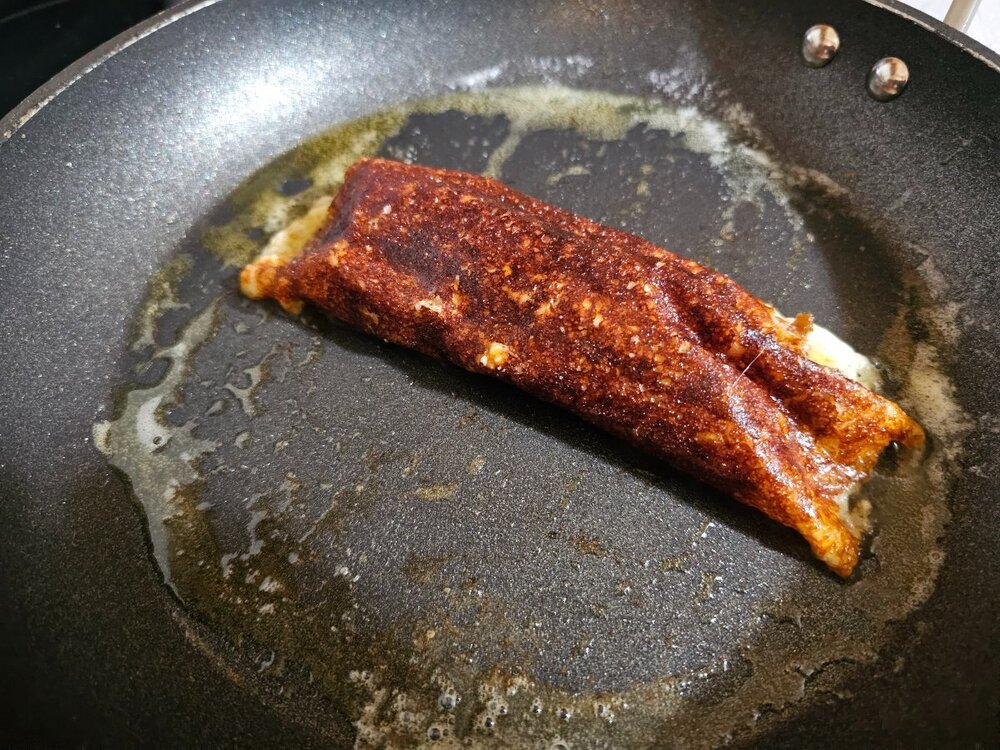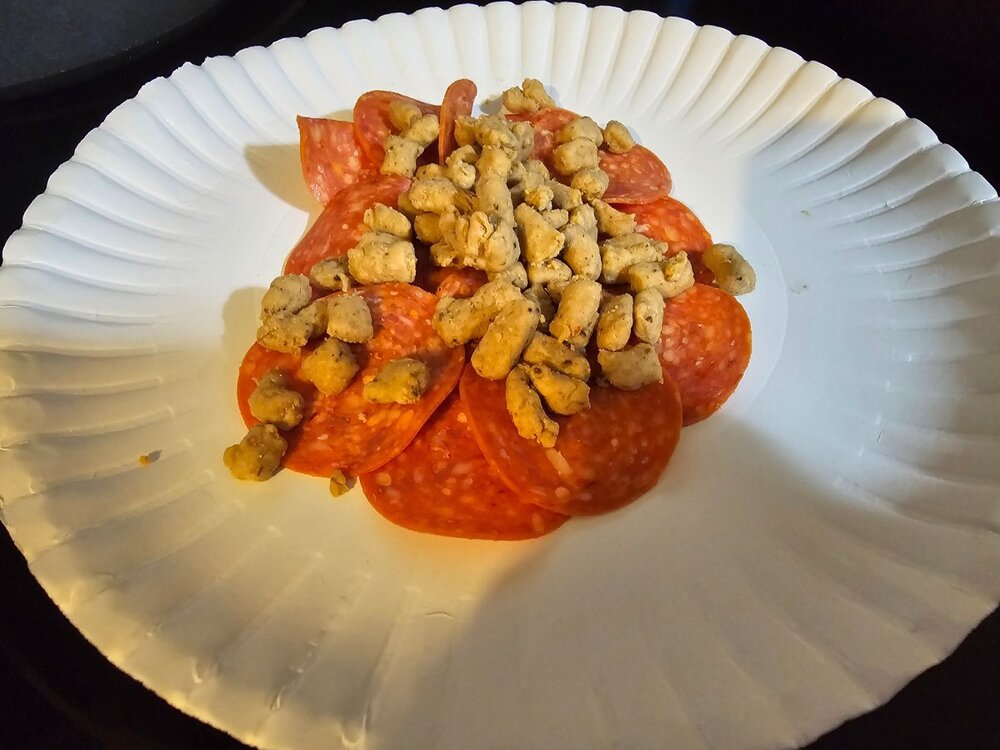Everything posted by Bob
-
My leg and foot cramps have mysteriously disappeared
Slept perfect all weekend as well. I also added a 6th potential reason. I had around the same time ran out of my favorite seasoning, so for the last couple weeks I've only been using salt and nothing else. This is still not likely. But, I just picked some up, so I will add back in seasoning this week. And then some K2 next week. Again, my guess is that these are benign. I will then check my labs before adding Niacin back in. I want to formerly guage if the Niacin is really of any benefit. It's higher on my list as a possibility because it does have side effects (flushing). After doing some research, while Niacin is often used by body builders to help build muscle by delivering more oxygen to the muscles, it can also cause muscle breakdown in people with chronic kidney disease. That would be me, lol.
-
What Did You Eat Today?
So on Friday we went out to eat at a restaurant that had something they called "burnt cheese rollovers" that were "Atkin's friendly". So on Saturday I thought I would try to make a carnivore-friendly version of them at home, and it was suprisingly easy. I had this one pictured below with pepperoni and sausage. And Sunday morning I made one with scrambled eggs and sausage. They are crazy addictive...
- Electrolytes...
-
My leg and foot cramps have mysteriously disappeared
I've been experiencing a period of peace and rest for the last 2 weeks, lol. And I don't know what has caused this to happen. But, I was DYING with leg and foot cramps that would wake me up from sleep. Or, make it impossible to swim in the pool. To combat them, I would salt generously and take magnesium. When that failed me, I would take an electrolye mix that had some potassium - which I usually avoid due to my kidneys. About 2 weekends ago i went a few days forgetting to take my prescriptions. That's when I noticed it. So, I started to wonder if it was the fenofibrate I take for my triglycerides. In hindsight, the cramps started around the same time I started taking that. But, keeping my trigs down is important so I resumed taking the prescription and have nonstop for the last 2 weeks. The cramps haven't returned, so I can probably rule that out. In the same time period though, I have reduced my salt and magnesium intake, and ran out of niacin (which I also took for trigs) and vitamin k2. I am also getting some damn good sleep at night now, lol. So I am still waiting for the cramps to return, not that I want them to. So it may come down to a few possibilities... 1) Reduced salt. 2) Reduced magnesium. 3) Eliminated k2 (not likely) 4) Eliminated Nicotinic acid/Niacin 5) Kidneys are healing (also not likely) I've got some research and experimentation to do.
-
Help us with a study on Carnivore!
I was just wondering if you looked into OwnYourLabs.com and compared their pricing with the particular labs you would like to run. That website offers extremely cheap pricing on blood work for most tests (although, Cystatin C was expensive so I went with UltaLabs for that one). OwnYourLabs.com works with LabCorp, so everyone can get their results online. These results could then be forwarded to you for compilation and analysis.
- What Did You Eat Today?
- 🧪 The Only Decent Fibre Study We Have
-
Just started and going extreme
When I started I would either barely go at all for days, and imagined I was "constipated", or it would be like turning on the tub faucet with so much force I almost elevated off the seat, lol. It took about 6 weeks for mine to return to my new normal. I get diarrhea from time to time, but it's rare now so when I do it may not even be diet related at all. Welcome aboard, btw! 😄
-
Hello
Welcome aboard @The Hamburgler 😄 I've only heard of priming in passing. Never looked into in depth or listened to a video that talked about it. I started with dirty keto, then moved on to clean keto, then ketovore, then carnivore, then lion diet, and now I am carnivore most of the time, save for once or twice a month. Intermittent fasting came easy with strict carnivore, especially when I was laid up with my broken ankle. But when I returned to work it got harder, because I work hard, and a hard working man needs to eat, lol.
-
Hi, new Carnivore here...with a question or two.
I must say I am envious of those who have broke their soda habits, lol. I love my bubbles so much. I even purchased a DrinkMate (comparable to Soda Stream) to make my own fizzy drinks, but I usually make some sort of diet soda. I can drink a San Pelligrino just fine, but carbonating my tap water is not very palatable. Regarding artificial sweeteners for taste - for some people it's a trigger and they will go off plan and binge. For others, it causes a cephalic phase insulin response and raises their insulin, hampering weight loss. I'm lucky in that I don't seem to struggle with either issue.
-
How do you control the urge to eat when you're fasting/dieting?
This makes me think of how the dog somehow knows that either my wife or I is going to pull in the driveway any moment now, even though they can't tell time and have no idea it's 5pm. Internal body clock. Likewise, we may have an internal body clock programmed to eat at certain times, not out of hunger or need, but out of mere routine. We just need to break the cycle.
-
Fat Carnivore to Fit Carnivore
10 km = 6.2 miles. 23 km = 14.29 miles. Wow! That is impressive! Welcome aboard, btw 🙂 You basically listed all my favs 😄
-
Help us with a study on Carnivore!
Thank you @SallyB for providing additional information about yourself, your practice, and your prospective study. Welcome aboard! What about testing the food itself? There is a lot of information (and granted, we consume most of it through YouTube videos) about how meat and organs are rich in vitamins and other nutrients, and even how these are more bioavailable that their counterparts found in plants. The most infamous examples being how the body has to struggle to convert beta-carotene into the usable form of Vitamin A, retinol, whereas it's already in that form in meat products. Or, how the Omega-3's from animal sources are in the forms we need, EPA and DHA, whereas Omega-3's in plants are in the form of ALA and we don't do an efficient job at converting them to a usable form? Logic would follow that if meat and organs contain abundantly more nutrients vs plants, AND they are already in a form that the human body can easily use without any difficult conversion processes, then a meat-heavy or carnivore-centric diet is going to be very good for you. In the meantime, you might find this video interesting. They has so many tests ordered I'm surprised they even had any blood left, lol...
-
Tuesday ZOOM meeting for Carnivore Talk members
until
Zoom information is available in this members only link... https://carnivoretalk.com/topic/821-zoom-meeting-for-7pm-est-tuesday-august-6th/ -
Help us with a study on Carnivore!
I let this one through because I was unable to determine if this is legit or not, but I have some reservations. Be aware that DocSallyND.com is a parked domain. There is no website there. There is also no online presence or Google Map location for any business called "Mountain Apple Medicine". There is a "Dr Sally Daughtrey ND" on this page... https://hawaiind.org/nd/mountain-apple-medicine/ ... but our member named has the username SallyB. And some final thoughts.... What is being tested, and what lab is being used? Several key labs are actually very cheap at the lab services we typically recommend. There is a plethora of information on the internet, from nutritionists, doctors, MD's and DO's, etc who have already done this research. My apologies for my skepticism in advance if this is legit, but I have a responsibility to protect the community.
- What Did You Eat Today?
- What Did You Eat Today?
-
help: sticky poop sticks to bowl for both me and my daughter on carnivore diet: ground beef and eggs.
True, lol. I make a carnivore ice cream on occasion with honey as a sweetener. I actually didn't like it so much, so now I cut it in half with some allulose.
-
help: sticky poop sticks to bowl for both me and my daughter on carnivore diet: ground beef and eggs.
Whether raw honey is "carnivore" is a debated topic. It's not *directly* made from plants, although bees use plants to make it. Some call or bee vomit, lol. Since I aim to be ketogenic with my diet, this rules out honey most of the time. I think the medicinal use of plants is just fine. Almost all medicines are plant derived. The "challenge" is just a fun way for us to keep ourselves motivated and to hold each other accountable.
-
New to This Diet and have Questions
That's definitely one of the reasons why this diet works so well. The food is satiating. It's easy to not snack, and hold off from meal to meal. This gives your body time to actually metabolize some of it's own fat.
-
Daily Exercise
I don't have a set routine at the moment. It's my busy season for my business, which is a physical job. And then when I get home I am still constantly doing stuff around the house, taking the dog for long walks, etc. In the autumn we will hit the trails to participate in the local counties Fall Hiking Spree. For the winter, I bought a treadmill.
-
Possible first non-carnivore craving (LOL)
There are some things I miss. I was a food lover, and could eat just about anything. I certainly had my hyperpalatable favorites. I am tired of yo-yo dieting and gaining back the weight, and when chronic diseases started to be an issue and now they are gone - well - I just can't go back, no matter how much I would love to binge on a pizza or have my favorite burrito, or my favorite dish at the chinese restaurant.
-
Carnivore and blood sugar
Lol. Be careful. We have a guy on here that heard the same thing but has been letting us know for months he hasn't seen any miracles yet - but at the same time he has nothing to cure. I'll be curious to see your results. Here's a video I found. I haven't watched it all the way through yet, but it seems relevant here...
-
What Did You Eat Today?
No. And the place where I get them serves them with lemon slices and hot sauce and horse radish so you can modify the taste or spice it up if you like. Raw on the half shell is the way to go. The only other oysters I've had came out of a can ready to eat, like sardines, and they were putrid. --- NY Strip last night. This morning, eggs and sausage. ^ my staples, lol
-
help: sticky poop sticks to bowl for both me and my daughter on carnivore diet: ground beef and eggs.
You could participate by doing a 30-day no plants at all challenge. This is basically the gist of it.








